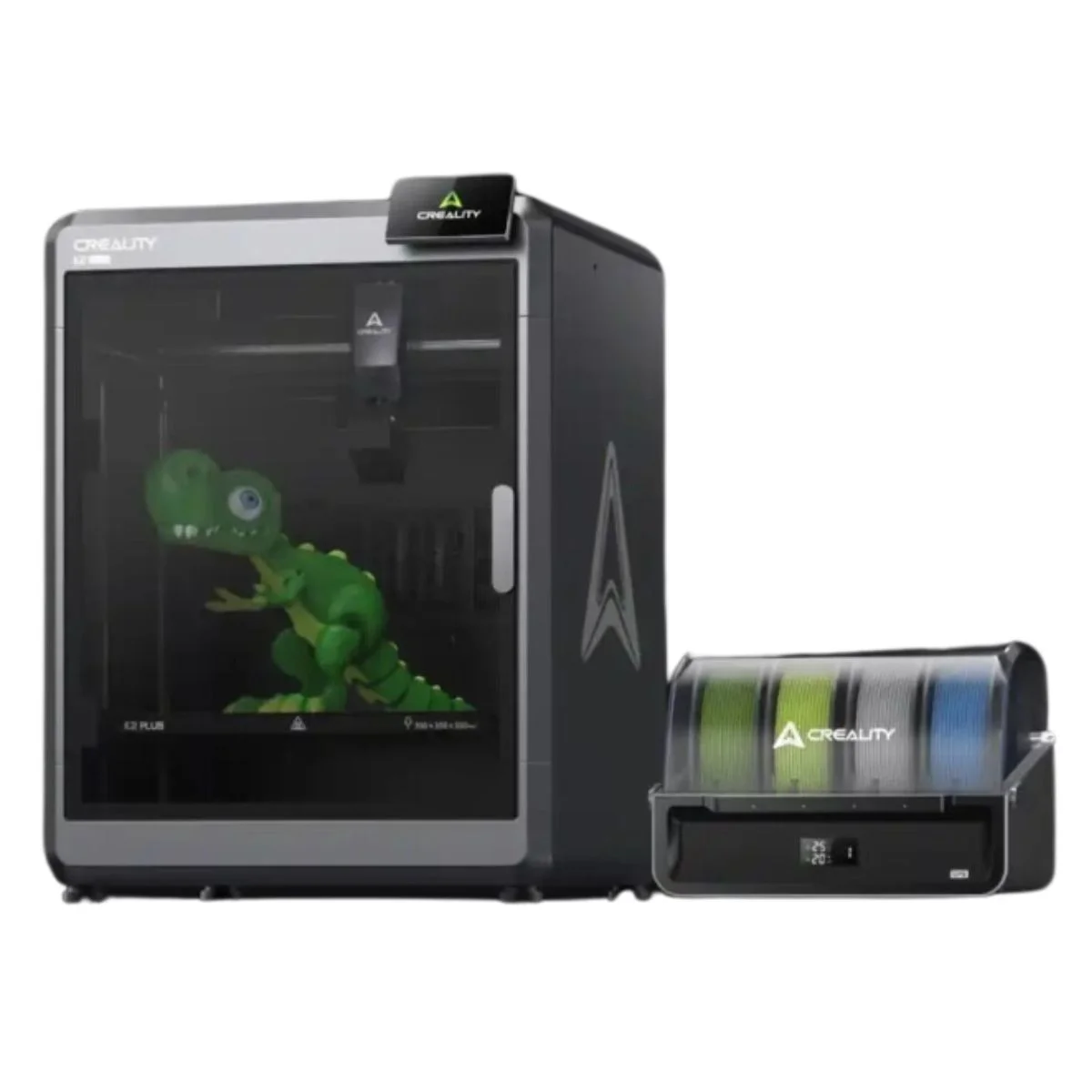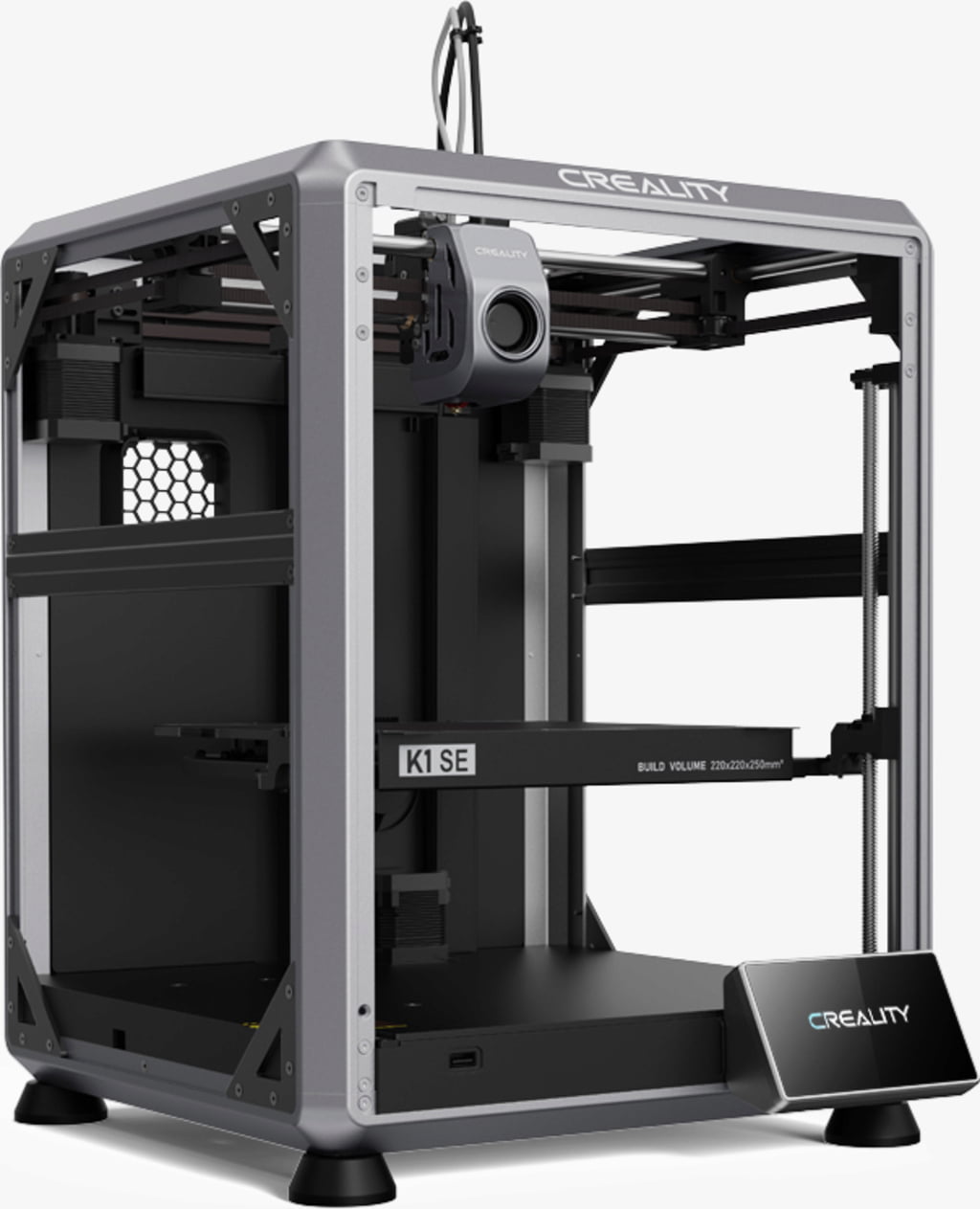Compare K2 Plus vs K1 SE
Comparison between the best 3D printers
Choose the best 3D printer at the best price. The cheapest 3D printers are here.
Buy a 3D printer here with 3D Fila.
 |
 |
|
| Model | K2 Plus[BUY K2 Plus] |
K1 SE |
| Printing Material | Filament | Filament |
| Buy Filament for Creality K2 Plus | Buy Filament forCreality 3D K1 SE | |
| Estimated price | $1500,00 | $349,00 |
| Manufacturer | Creality | Creality 3D |
| Release Year | 2024 | 2023 |
| Print Volume [mm] | 350x350x350 | 220x220x250 |
| Printer Size [mm] | 495x515x640 | 355x355x480 |
| Weight [kg] | 33,5 | 10,24 |
| Power Loss Recovery | YES | YES |
| Enclosed printer | YES | NO |
| Bed Leveling | Automatic | Automatic |
| Filament End Sensor | YES | YES |
| Bed type | Heated | Heated |
| Power supply system | Direct Drive | Direct Drive |
| Standard nozzle | 0,4 | 0,4 |
| Maximum Nozzle Temperature [°C] | 350 | 300 |
| Maximum Bed Temperature [°C] | 120 | 100 |
| Maximum printing speed [mm/s] | 600 | 600 |
| Filament holder | YES | YES |
| Camera for supervision | YES | YES |
| Recommended filaments | PLA, PETG, PET, TPU, PA, ASA, PC, PLA CE, PA-CF, PET-CF | Hyper PLA, PLA, PETG, PET, TPU |
| Recommended slicers | Creality Print 5, Bambu Studio, Super Slicer, Cura, Prusa Slicer, Orca Slicer | Creality Print; Cura, Simplify3D e PrusaSlicer |
| Maximum Resolution [mm] | 0,1 | 0,1 |
| Processor | ||
| Display | Touchscreen 4,3'' | Display touchscreen 4,3'' |
| Power Supply | 1200 W | 110/220V / 350W |
| Connectivity | USB / WIfi | Ethernet / USB / Wi-Fi |
| Operating systems | Windows, Linux, Macbook | Windows, Mac, Linux |
| Date of registration in the system | 2024-06-26 | 2023-08-26 |
| Release date | 2024 | 2023 |
| Extra features | The Creality K2 Plus 3D Printer stands out for its multicolor printing, large build volume (350x350x350 mm) and Apus Direct Drive extruder with tri-metal protection nozzle. It features automatic anti-tilt leveling, FOC closed-loop motors and active chamber heating. In addition, it has an intelligent CFS filament management system, cameras for calibration and monitoring, a 4.3-inch touchscreen and advanced sensors to optimize the printing process. | The Creality K1 SE is a high-speed 3D printer with CoreXY system, capable of printing at up to 600mm/s with acceleration of 20000mm/s². It has a dual-gear extruder, easy-to-replace tri-metal nozzle, automatic leveling, and advanced features such as vibration reduction algorithms and intelligent operation. Its rigid cast aluminum frame ensures stability, while the open-source Klipper-based system offers freedom for customization. It is pre-assembled for a simplified and fast user experience. |
| Support for multiple colors and materials (AMS and CFS) | YES | NO |
Notes * |
||
| Cost-benefit | 7 / 10 | 7 / 10 |
| Hardware | 7.2 / 10 | 4 / 10 |
| Tela | . | . |
| Print volume | 4 / 10 | 3 / 10 |
| Performance | 5 / 10 | 5 / 10 |
| [BUY K2 Plus] |
Conclusion |
| In comparing the Creality K2 Plus and the K1 SE 3D printers, several key factors emerge, particularly regarding their capabilities, features, and value for money. The **Creality K2 Plus** stands out with its larger print volume and advanced printing features. With a build size of 350x350x350 mm, it caters well to users needing to create larger models or multiple parts simultaneously. Its enclosed design, automatic leveling, and intelligent filament management systems enhance its usability and expand the range of materials that can be effectively printed. Furthermore, advanced features like camera oversight and multicolor printing capabilities position the K2 Plus as suitable for professionals and serious hobbyists looking for high-fidelity prints. The 2024 release year reflects the latest technology, ensuring better long-term support and evolution of features. On the other hand, the **K1 SE** offers significant advantages in terms of speed and customizability. With a CoreXY system allowing for maximum speeds of 600 mm/s and quick acceleration, it is tailored for users prioritizing efficiency in their print jobs. Its lighter frame contributes to its portability, making it a good option for those with limited space or who favor mobility. Additionally, the open-source software environment provides opportunities for customization, appealing to tech-savvy users. However, its lack of an enclosed design and smaller build volume may limit its application for more complex or larger projects. Ultimately, the choice between the K2 Plus and K1 SE depends on the specific needs and priorities of the user. If large, complex prints and a feature-rich experience are primary considerations, the K2 Plus is a compelling choice. Conversely, for those who prioritize speed and customizability in a more compact form, the K1 SE offers an excellent balance of performance and value. Each printer is effective in its domain, demonstrating that the best option ultimately hinges on the user’s intended applications and preferences. |

